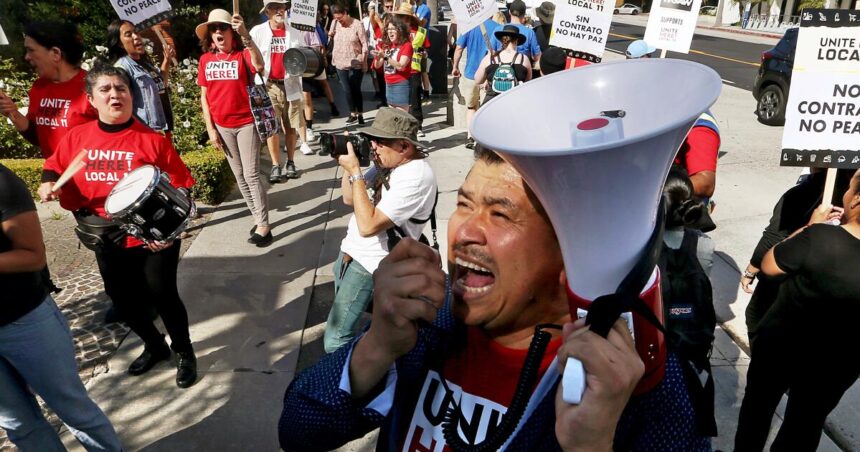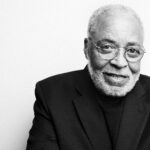A new city report has given a boost to a proposal by City Council members to raise the minimum wage for workers at large hotels and Los Angeles International Airport in preparation for the 2028 Summer Olympics.
The report, released Thursday by Sharon Tso, the city’s chief legislative analyst, concluded that a proposed gradual wage increase to $30 an hour by the time Los Angeles hosts the Olympics would improve the wage inequality problem and help the local economy. The study was conducted by outside consultant Berkeley Economic Advising and Research.
Unions representing tourism and hospitality workers have used the survey results to renew their demands for wage increases as the city prepares for its next move.
“This report confirms what we’ve been saying for years: essential airport workers like myself and my colleagues need to be and are entitled to a true living wage,” said Jovan Houston, an LAX customer service agent and SEIU United Service Workers West executive and board member, according to a news release from the coalition last week.
Los Angeles tourism workers have long been sounding the alarm about the cost of living in the city, arguing wage increases are needed to keep prices from rising outside the city amid fears the Olympics will make housing even more expensive.
The living wage ordinance was first proposed by Los Angeles City Council members Karen Price and Katie Yaroslavsky, and several other council members have also supported the bill. The ordinance would raise salaries for hotel employees in hotels with 60 or more rooms, including certain categories of LAX employees, such as security guards and janitors.
Industry groups including the hotel association, the Asian American Hotel Owners Association of Los Angeles and the California Hotel & Lodging Association had previously voiced opposition to the proposal, arguing that hotels would suffer from increased labor costs.
“Los Angeles’ hotel industry provides thousands of good-paying jobs while generating millions of dollars in local taxes and billions of dollars in economic activity for the region, yet tourism still has not fully returned to pre-pandemic levels,” Jackie Fila, president of the hotel association, said in an emailed statement Monday.
The proposed increase would affect an estimated 23,000 workers, about two-thirds of whom live in the city of Los Angeles, according to the report. Putting more money in the pockets of these residents would benefit the city’s economy by encouraging them to spend more and creating new jobs, according to an economic analysis.
The proposal initially aimed to raise the minimum wage to $25 an hour by 2023, then increase it by $1 each year thereafter, reaching $30 by 2028. Given the delay in considering the proposal, the report lays out an updated timeline, within which hourly wages would jump: monthly increases to a minimum of $24.40, reaching $30 an hour by July 1, 2028.
The report said that while the majority of those affected by the raises are airport employees, hotel employees will get bigger raises because they tend to earn lower wages. Airport employees’ hourly wages will increase by an average of $3.87, while hotel employees’ salaries will increase by an average of $6.24, according to the report.
The report concludes that the increased costs will be absorbed primarily by travelers paying higher hotel rates and other increased costs.
“While these benefits will entail increased costs for the affected sector, they are being sought to address long-standing wage disparities,” the report states. “Importantly, the burden of these increased costs will not fall primarily on City of Los Angeles residents.”
A coalition of several unions, including Unite Here Local 11 and other labor groups, continued to demand a wage increase. The coalition plans to hold another protest in front of Los Angeles City Hall starting Tuesday, where workers and organizers are expected to camp out in tents to pressure the City Council to schedule a vote on the proposed living wage ordinance.
City Council members Hugo Soto-Martinez, Heather Hutt and Unices Hernandez spoke in support of the wage increase at a rally last summer.
“If this city is going to host a world-class event, the Olympics, we cannot have workers making poverty wages,” Soto-Martinez said at the rally, whose mother worked at the airport for 25 years.
The report notes that the Office of the Chief Legislative Analyst received revenue and occupancy figures from the Hotel Association. It will return to Los Angeles only after the study is completed. The analysts will evaluate the information submitted, and new conclusions will be sent to the council if the study’s findings change, according to the report.
Alice Walton, a spokeswoman for the Hotel Assn., said the group declined to share the information at the time because the hotel was negotiating a collective bargaining agreement with a local union and that the requested data was shared after the contract was in place.
The report estimated $700 million in new revenue from wage increases for the city of Los Angeles but did not explain how it arrived at that figure, she said.
Berkeley Economic Advice and Research did not seek to consult other tourism groups or third-party reports that might have provided the data sought about Los Angeles’ tourism situation, she said.
(Tag Translation) Business









